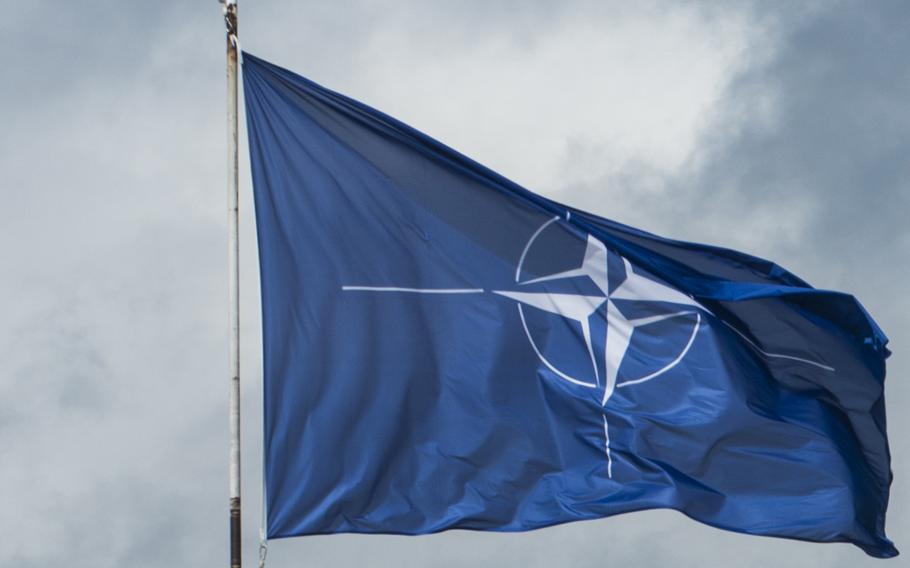
A flag is shown during the change of command ceremony for the supreme allied commander Europe at Supreme Headquarters Allied Powers Europe in Brussels, May 14, 2013. (D. Myles Cullen/Defense Department)
(Tribune News Service) — On Sept. 12, 2001, 24 hours after the 9/11 attacks, representatives of the then-19-member North Atlantic Treaty Organization convened to invoke Article 5 of the NATO charter, which holds that an “armed attack” on one member “shall be considered an attack against them all.” This was the first and only time Article 5 has ever been put into effect. For the next two decades NATO forces fought with us in Afghanistan and elsewhere.
On Saturday, former President Donald Trump ranted against NATO at a rally in Las Vegas. “We’re paying for NATO and we don’t get so much out of it,” he lied. “And you know, I hate to tell you this about NATO — if we ever needed their help, let’s say we were attacked, I don’t believe they’d be there. I don’t believe. I know the people. I know them. … I don’t believe they’d be there.”
Trump has long talked about NATO as if it’s some sort of obsolete club where everyone is supposed to pay dues into a common kitty but America has been left picking up everyone’s tab. That’s not how it works. NATO’s standalone budget is about $3.5 billion, of which we pay 16% or roughly $560 million. A new aircraft carrier costs about 20 times that. All other “NATO spending” takes the form of domestic defense expenditures by individual member states. When he was president, Trump was right to pressure other countries to spend more, but now that they are spending more, he doesn’t care.
Trump’s calumnies against NATO are offered to bolster his distortions about supporting Ukraine. In his telling, both are examples of how the United States gets ripped off by its alliances and foreign engagements. He claimed we’ve spent “$200 billion plus” on Ukraine while the Europeans “are in for $20 billion.”
This, too, is false. According to the Ukraine Support Tracker, in total assistance, the European Union has contributed more to Ukraine than the United States. We’ve committed not $200 billion-plus but about $75 billion in aid, about half of that in military assistance. The EU total is roughly 77 billion euros, or roughly $83 billion. As a share of GDP, America ranks 30th in Ukraine support, just behind Ireland and Malta.
We look better if you only count military aid, for the simple reason that we have the hardware Ukraine needs, and Malta not so much. Indeed, as my American Enterprise Institute colleague Marc Thiessen notes, the important thing — at least for domestic political purposes — about our military aid is that it doesn’t take the form of giving Ukraine a “blank check,” as many Republicans claim. Nearly 90% of military aid dollars stay in America, disproportionately in Republican districts and states, because they’re used to purchase the weapons that go to Ukraine.
If you care about American relative military superiority, supporting Ukraine has been a huge bargain, degrading Russia’s military, helping update ours, and bolstering the security of our biggest trading partner, without putting American troops at risk.
While it’s always useful to point out Trump’s thumbless grasp of the facts, none of this is exactly new information for people who actually care about the facts. The problem is how little facts seem to matter these days.
Prior to Russia’s lawless invasion of Ukraine, the argument that NATO was obsolete had some superficial plausibility. But now that Russia has repeatedly signaled that it has aims beyond Ukraine, toward NATO members, those already weak arguments have evaporated. Certainly, our allies believe the threat is very real.
And those aren’t the only threats on the world stage. Proxies for Iran killed three U.S. service members over the weekend in a drone attack in Jordan. Russia, China and Iran have grown quite chummy. Our ally, Israel, is in a bloody war with Hamas, an Iranian proxy that ignited the conflict on Oct. 7. In short, this is the dumbest possible time to be talking about how America shouldn’t honor its alliances and commitments.
Joe Biden’s critics love to argue that when it comes to Iran and China “weakness is provocative.” They’re right. But it’s also true with Russia. And tough talk can signal weakness, too. Trump’s denigration of NATO might sound like political “toughness” to his fans. But what Vladimir Putin and Xi Jinping hear is evidence of NATO’s weakness.
NATO, and our alliances generally, make America stronger. They allow us to project power globally at a fraction of the cost to do it in other ways. For those who disagree, it’s worth considering why the former president rests his case against NATO on so many lies. If the facts were on Trump’s side, he’d offer some.
Jonah Goldberg is editor-in-chief of The Dispatch and the host of The Remnant podcast.
©2024 Tribune Content Agency, LLC.